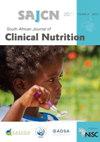Effect of simplified dietary advice on nutritional status and uremic toxins in chronic kidney disease participants
IF 0.8
Q4 NUTRITION & DIETETICS
引用次数: 2
Abstract
Background: Traditional chronic kidney disease (CKD) dietary advice is challenging with many restrictions, consequently adherence to the CKD diet is low. Recent literature has proposed less restrictive dietary guidelines in CKD to improve dietary adherence and outcomes; however, limited evidence of its implementation exists. Objectives: This study (trial number: PACTR202002892187265) investigated the effect of simplified dietary advice on nutritional outcomes and adherence after four weeks of dietary advice. Design: A before-and-after study was conducted. Outcome measures: Sociodemographic, clinical and biochemical information was collected and anthropometric measurements performed on Stage 3–5 CKD participants attending a pre-dialysis clinic. Uremic toxins were quantified by UPLC/fluorescence detection. Dietary intake was assessed using a quantified food frequency questionnaire (QFFQ). Participants were educated by the study dietitian on simplified dietary advice using an infographic. A diet-adherence score sheet monitored adherence. All outcomes were measured at baseline and four weeks after the diet was advised. IBM SPSS® version 27 was used for statistical analysis. Results: Fifty-nine participants, mean age 41.0 ± 11.6 years, completed the study. After four weeks, significant improvements were found in body mass index (p < 0.006), waist circumference (p < 0.001), mid-upper arm circumference (P < 0.001), serum total cholesterol (p < 0.045), serum triglycerides (p < 0.017), energy (p < 0.001), protein (p< 0.001) and most dietary intake variables. Overweight and obesity prevalence was high at 68%. Uremic toxin concentrations remained stable. Dietary adherence was 88.6%. Conclusion: The simplified dietary advice suggests improved nutritional outcomes in CKD patients who were predominantly overweight and obese, without compromising kidney function. This study highlights the importance and feasibility of simplified nutrition education in CKD.简化饮食建议对慢性肾脏疾病参与者营养状况和尿毒症毒素的影响
背景:传统的慢性肾脏疾病(CKD)饮食建议具有许多限制,因此对CKD饮食的依从性很低。最近的文献提出了限制性较低的CKD饮食指南,以提高饮食依从性和预后;然而,其实施的证据有限。目的:本研究(试验号:PACTR202002892187265)调查了简化饮食建议对营养结局和四周饮食建议依从性的影响。设计:进行前后对照研究。结果测量:收集社会人口学、临床和生化信息,并对参加透析前诊所的3-5期CKD参与者进行人体测量。采用UPLC/荧光法定量检测尿毒症毒素。采用量化食物频率问卷(QFFQ)评估膳食摄入量。研究营养师使用信息图表对参与者进行了简化的饮食建议教育。饮食坚持计分表监测坚持情况。所有的结果都是在基线和饮食建议后四周测量的。采用IBM SPSS®version 27进行统计分析。结果:59名参与者完成研究,平均年龄41.0±11.6岁。四周后,体重指数(p< 0.006)、腰围(p< 0.001)、中上臂围(p< 0.001)、血清总胆固醇(p< 0.045)、血清甘油三酯(p< 0.017)、能量(p< 0.001)、蛋白质(p< 0.001)和大多数饮食摄入变量均有显著改善。超重和肥胖患病率高达68%。尿毒症毒素浓度保持稳定。饮食依从性为88.6%。结论:简化的饮食建议可以改善以超重和肥胖为主的CKD患者的营养结局,而不影响肾功能。本研究强调了CKD简化营养教育的重要性和可行性。
本文章由计算机程序翻译,如有差异,请以英文原文为准。
求助全文
约1分钟内获得全文
求助全文
来源期刊

South African Journal of Clinical Nutrition
NUTRITION & DIETETICS-
CiteScore
2.50
自引率
9.10%
发文量
21
期刊介绍:
1.The Journal accepts articles from all basic and applied areas of dietetics and human nutrition, including clinical nutrition, community nutrition, food science, food policy, food service management, nutrition policy and public health nutrition. 2.The Journal has a broad interpretation of the field of nutrition and recognizes that there are many factors that determine nutritional status and that need to be the subject of scientific investigation and reported in the Journal. 3.The Journal seeks to serve a broad readership and to provide information that will be useful to the scientific community, the academic community, government and non-government stakeholders in the nutrition field, policy makers and industry.
 求助内容:
求助内容: 应助结果提醒方式:
应助结果提醒方式:


